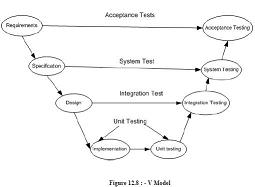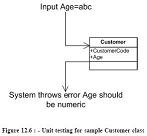What is V model in testing
What is V model in testing?
✍: Guest
V model map’s the type of test to the stage of development in a project.

Unit Testing
Starting from the bottom the first test level is "Unit Testing". It involves checking that
each feature specified in the "Component Design" has been implemented in the
component.
In theory an independent tester should do this, but in practice the developer usually does
it, as they are the only people who understand how a component works. The problem
with a component is that it performs only a small part of the functionality of a system,
and it relies on co-operating with other parts of the system, which may not have been
built yet. To overcome this, the developer either builds, or uses special software to trick
the component into believe it is working in a fully functional system.
Integration Testing
As the components are constructed and tested they are then linked together to check if
they work with each other. It is a fact that two components that have passed all their
tests, when connected to each other produce one new component full of faults. These
tests can be done by specialists, or by the developers.
Integration Testing is not focused on what the components are doing but on how they
communicate with each other, as specified in the "System Design". The "System Design"
defines relationships between components.
The tests are organized to check all the interfaces, until all the components have been
built and interfaced to each other producing the whole system.
System Testing
Once the entire system has been built then it has to be tested against the "System
Specification" to check if it delivers the features required. It is still developer focused,
although specialist developers known as systems testers are normally employed to do it.
In essence System Testing is not about checking the individual parts of the design, but
about checking the system as a whole. In fact it is one giant component.
System testing can involve a number of specialist types of test to see if all the functional
and non-functional requirements have been met. In addition to functional requirements
these may include the following types of testing for the non-functional requirements:
Performance - Are the performance criteria met?
Volume - Can large volumes of information be handled?
Stress - Can peak volumes of information be handled?
Documentation - Is the documentation usable for the system?
Robustness - Does the system remain stable under adverse circumstances?
There are many others, the need for which is dictated by how the system is supposed to
perform.
Acceptance Testing
Acceptance Testing checks the system against the "Requirements". It is similar to systems
testing in that the whole system is checked but the important difference is the change in
focus:
Systems testing checks that the system that was specified has been delivered. Acceptance
Testing checks that the system will deliver what was requested.
The customer should always do acceptance testing and not the developer . The customer
knows what is required from the system to achieve value in the business and is the only
person qualified to make that judgment. This testing is more of getting the answer for
whether is the software delivered as defined by the customer. It’s like getting a green flag
from the customer that the software is up to the expectation and ready to be used.
2007-10-30, 7706👍, 0💬

